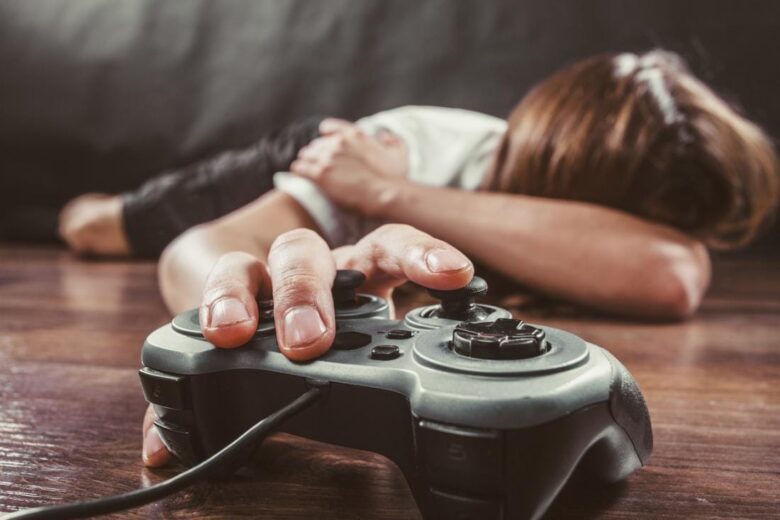Gaming is among the fastest-growing industries in the world, largely thanks to technological developments that allow for the creation and distribution of immersive games. Statistics show that most gamers are between the ages of 18-34, which means that many of them are in their college years.
Aside from fun, gaming offers a variety of benefits to students; however, it also has its risks, most notably addiction. Thus, students should know how to balance gaming with their education properly, and we have some great tips to help.
Why Do College Students Engage in Online Gaming?

Source: newportacademy.com
Many parents and educators have a negative opinion about online gaming, and one might wonder why many students participate in it. The motivations can vary from student to student, but here are some common reasons.
Stress Relief and Relaxation
College can be stressful due to academic pressure, deadlines, exams, and other personal challenges. So, naturally, students will turn to gaming as one of the easiest ways to relax and unwind.
Social Interaction
Online gaming keeps students in touch with their peers and friends. It helps them stay connected with other individuals and play games regardless of location. Additionally, multiplayer games provide a platform for students to socialize and build communities.
Entertainment
Collegians need fun recreational activities, and gaming is one of them. It gives them a break from their routine and can add fun to their daily or weekly routine. Furthermore, gaming is a safe and enjoyable way to have fun compared to other extreme options that some students engage in.
Flexibility and Accessibility
Students can participate in online gaming from the comfort of their own homes or dorms. Some games are also mobile-friendly and can be played on the move during breaks. It offers a lot of convenience for students with busy schedules.
Competition and Sense of Achievement
With the rise of Esports competitions, gamers are now drawn to the challenge of competing with others and receiving rewards. It might offer students some sense of achievement, especially those struggling with self-esteem.
Despite the above advantages, students should practice moderation with online gaming; otherwise, it might affect other parts of their lives.
Online Gaming Risks for College Students

Source: health.harvard.edu
Like every other form of entertainment, online gaming has some risks college students should know about. These risks are why they need to know how to balance online gaming with their academics and personal lives.
Excessive Gaming Can Affect Academic Performance
Students who spend too much time gaming have less time for important responsibilities such as studying or completing assignments. Lack of adequate time for schoolwork is one of the main reasons students turn to EssayUSA essay writing services for academic assistance. Students might also procrastinate other tasks while gaming, leading to missed deadlines.
Financial Concerns
Students who spend real-world money on gaming micro-transactions run the risk of overspending, which can affect their financial stability in college. Purchasing too many games can also diminish a student’s budget.
Social Isolation
While online gaming can help students create friends and maintain long-distance friendships, it can also affect students’ ability to socialize. Some students might prefer isolation to forming real-life connections.
Addiction
Students can develop gaming addiction, which may make them unable to control their gaming habits. Consequently, they may end up neglecting some of their responsibilities. They might also face withdrawal symptoms when not gaming, which can affect their concentration during classes and studying.
These risks may cause serious issues when left unchecked. Thus, collegians should practice moderation with online gaming, and we have some tips to help create a good balance.
Tips for Balancing Academics With Online Gaming
College gamers need a good balance between their academic responsibilities and online gaming. Creating a balance ensures you can enjoy the perks of online gaming, such as stress relief and entertainment, without affecting your academics or personal life. Let’s explore some tips for creating a good balance.
Create a Realistic and Flexible Schedule
A good schedule can ensure you allocate enough time for academics and gaming. Take your time to create a timetable that accommodates your classes, assignments, and exams. From there, you can allocate your gaming hours, maybe a few hours daily or weekly.
Note that things change, and sometimes you might need to adjust your schedule to accommodate changes, for example, urgent assignments. Once you have a good schedule, stick to it unless you have good reasons to make some adjustments.
Prioritize
Your education is more important than online gaming. Always prioritize your learning when it comes to creating a schedule and even adjusting it. When you need more time for your academics, don’t be afraid to reschedule your gaming. You can always make it up to yourself during holidays and college semester breaks.
Avoid Procrastination
Procrastination is a problem many students battle with in college, especially while they adjust to the newfound freedom and personal responsibility. When collegians procrastinate, they often use other activities to divert their attention from what they are supposed to be doing.
Gaming can be a lethal way to procrastinate because it is more engaging and fun than that paper a student might be avoiding. So, you should know how procrastination works and avoid gaming when you have other work to do. It will take discipline to resist, but it is necessary to create a good balance between your studies and gaming.
Use Gaming as a Reward for Your Academic Work
Online gaming is a lot of fun, and you can use that to motivate yourself to complete your daily tasks. Instead of playing online games before studying, attending classes, or working on assignments, schedule them when you’re done with the day’s responsibilities. It will help you enjoy gaming without feeling guilty about unfinished tasks. It will also be more enjoyable because you will feel that you’ve earned it and thus deserve it.
Pick Games That Fit Into Your Lifestyle
There are different types of online games, and some are not suited for busy schedules. For example, some games are very competitive and require hours of practice and gameplay to improve. Such games might not be the best choice for students who want to focus on their studies.
Some programs are more challenging than others, and collegians taking such programs should aim for more relaxing games that require less effort to play. Students should also avoid games that are too stressful, scary, or violent that they might affect their mental health. Remember, gaming is supposed to be fun.
Set a Gaming Time Limit
When gaming, it’s easy for time to get away from you, and what you thought were thirty minutes of gaming can quickly turn into 4 hours. The best way to counter this is to set a time limit for gaming.
Most consoles come with a play time management feature that you can activate to limit when and how long you play games. You can also set an alarm each time you start gaming to know when to switch it off, work on something else, or sleep.
Let Your Friends Know About Your Time Constraints
If you frequently play online games with your friends, ensure they understand your academic priorities and schedules. For example, if they know you are only available on weekends, they can understand and not bother you with game invites during the week.
Separate Your Learning Space From Your Gaming Space
Serious students will always have a dedicated room or area for studying. This area needs to be neat and free from distractions, including the devices you can use for gaming. By having a separate space for gaming and learning, you will find it easier to separate the two, which improves concentration.
Monitor and Reflect
Once you’ve incorporated gaming into your schedule, monitor your academics in terms of productivity and grades. If you realize your grades are slipping or you often struggle to complete your assignments, you might have to cut back on online gaming and focus on your studies.
You should also check in with yourself and monitor your mental health to see what you might need to change. For example, consider making adjustments if you’re constantly stressed and your schedule allows very little free time for gaming. Similarly, if a game takes too much of your time or drains you mentally, consider cutting back or switching to easier games.
Seek Help
If online gaming starts affecting your academics, e.g., dropping grades and decreased motivation, it might be time to seek assistance. These might be the signs of gaming addiction, an issue that can affect your academics and normal well-being. Consult a counselor or join a support group and work with them to overcome it.
Shutdown

Source: medium.com
Online gaming is a fun way to relieve stress and socialize, but it requires moderation. College students must protect their academic goals and ensure that gaming habits do not affect their academics or general well-being.
Creating a good balance between academics and gaming is important for a healthy college lifestyle, and the above tips can help achieve it. However, finding the right balance might take some time, and you might make multiple adjustments to succeed.




